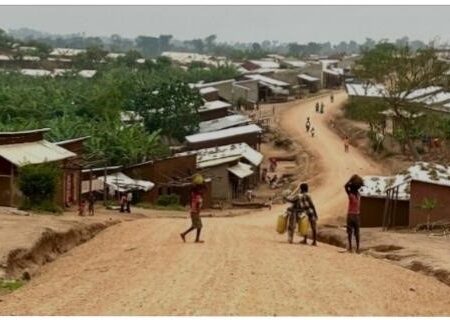Introduction
Deforestation which is the destruction of forests or felling of trees without replanting is a global issue that isn’t peculiar to Nigeria, nor is it a recent development.[1] Over time, the accelerating rate of deforestation in Nigeria has been attributed to population increase, increased logging activities, illegal grazing, agricultural expansion, urbanization, and industrial development among others.[2] This issue is pertinent because the forest contributes tremendously to man and nation’s survival and sustenance via its role in oxygen provision and carbon storage, reduction in air pollution through air purification, climate change mitigation, biodiversity conservation, eco-tourism, food security, timber and medicine provision, job creation, and revenue generation among others.
Extant bodies of literature on deforestation control in Nigeria has been replete with the contribution of the national and international government. Although the Forestry Research Institute of Nigeria (FRIN), which is responsible for forest development, played significant roles in curbing deforestation in Nigeria and helped to foster the response of the aforementioned bodies, its efforts are not widely known or thoroughly researched. Therefore, it is crucial to look into FRIN’s response to deforestation and the Institute’s shortcomings in doing so between 1999 and 2018. The former will enlighten the public on the response of FRIN and help investigate the effectiveness and shortcomings of the Institute’s response while the latter will explain the reason behind the accelerating state of deforestation despite FRIN’s contributions. To achieve this, this research will make use of both primary and secondary sources, while it will adopt historical, analytical, and descriptive approaches. The primary sources will include archival materials and oral interviews with oral interviews taking precedence whilst, the secondary source will include books, journals, and newspaper articles.
A Brief History of the Forestry Research Institute of Nigeria
FRIN was established in 1954 as the Federal Department of Forest Research to conduct research into all forestry aspects: forest creation, management, conservation/protection, improvement, and utilization. In 1977, the status of the department was changed to an institute by Decree No. 5 of 1977.[3] The Institute has seven specialized departments with subsections. The departments include Sustainable Forest Management, Forest Conservation and Development, Forest Product Development and Utilization, Forest Economics and Extension, Environmental Modelling and Management, Biosciences, and Wildlife, and Ecotourism. It also has ten outstations in all the country’s ecological zones and has four forestry colleges to train middle-level manpower.[4] In 1999, the Institute was transferred from the Ministry of Agriculture to the Ministry of the Environment, and in 2018, the Institute received an enabling law.


FRIN and Deforestation Control
According to the respondents (professors and experts of forestry) who oversee some of FRIN’s seven specialized research departments, the Institute (FRIN) made significant contributions to deforestation control between 1999 and 2018.[6] The extension services provided by FRIN represent one notable contribution. This involves educating the people on the importance of the forest, the wide range of activities that deplete the forests, the effect of forest depletion, and the sustainable use and management of the forest. Most people lacked this knowledge and thus engaged in deforestation which is detrimental to man and society. With this effort of FRIN, the number of people who were knowledgeable about the forest increased, leading to a reduction in deforestation. This decline was however inadequate due to the Institute’s inability to educate a larger audience, leaving many uninformed and involved in deforestation.
Furthermore, another profound contribution involves the Institute’s participation in annual afforestation and reforestation programs. This entails planting trees in forested and non-forested areas respectively. For instance, in 2018, FRIN planted over 500 hectares of trees. With the reforestation exercise of FRIN, ecologically degraded sites were restored. The Institute also encouraged the aforementioned among individual and government institutions by providing seedlings for such programs. Among farmers, the institute promoted agroforestry which is the planting of trees and crops together. Similarly, they trained people in tree planting and collaborated with other institutions in planting programs.
Additionally, the Institute played a vital role in curbing deforestation through its conservation efforts. This involved in-situ and x-situ conservation which is conserving forests and their resources within and outside their natural habitats respectively. While in-situ conservation was achieved through the creation, expansion, and maintenance of forest, nature, and biosphere reserves, x-situ conservation was achieved through the establishment of botanical gardens, zoological gardens, etc. The reserves were maintained through the use of working plans. This determined the size of trees to be cut and ensured the planting of felled trees. The Institute also encouraged the maintenance of sacred groves, a conservation method under the indigenous people’s control.
Furthermore, through the Institute’s involvement in forestry policy-making, it contributed to deforestation control. This was achieved by ensuring laws were enacted to limit logging activities, protect the forests, and replace felled trees. However, this hasn’t yielded much because of the problem of implementation which is under the control of the state and federal government of the country.
Limitations to Deforestation Control
In the course of this research and based on the findings derived from interviews with key stakeholders at FRIN, the several factors that undermined FRIN’s effort to curb deforestation included the incursion of herdsmen, the ignorance of the people, funding, the insecurity of the forest, and the Land Use Act of 1978 among others.[7] With these, the pace of deforestation continued rising at an alarming rate, giving the impression that the institution was doing nothing.
Despite the Institute’s extension services, many people were still ignorant about the forests and the detriment of deforestation. This greatly stifled FRIN’s efforts as many people continued to engage in deforestation. The herdsmen incursion was another challenging issue. The herdsmen took animals to the forests to graze and these animals through their consistent treading on the forest soils, hindered the natural regeneration of trees and destroyed the young trees planted. This made it difficult to replace felled trees and curb deforestation.
The insecurity in the forest further limited FRIN’s ability to plant and manage trees in some forests. The forest which is the laboratory of foresters was occupied by terrorist groups and thus foresters couldn’t approach such forest to carry out any reforestation or afforestation activities nor could they monitor and manage hitherto planted forests. Funding was also a major challenge as the Institute needed funds to engage in seedling production for distribution as well as training, forest planting, and management.
Additionally, a critical issue that inhibited the institute’s efforts was the Land Use Act of 1978. It empowered the state governments to contribute tremendously to Nigeria’s deforestation problem. This Act excluded the Institute from forestry policy implementation because it placed all the lands, including the forests, in the custody of the government. With this, the fate of the forest reserves and unexploited forests fell into the hands of the state governments who continued to prioritize revenue generation (from sale of forest resources-timber and non-timber) over conservation. The Institute for a long time has called for a review of this Act.
Conclusion
There is no doubt that FRIN contributed tremendously to curbing deforestation through education, forest reserve creation and management, afforestation and reforestation program, and policy formulation among others. These contributions seemed however inadequate and non-existent because of the accelerating rate of deforestation, ignorance of FRIN’s involvement in curbing deforestation, and the challenges that confronted the institution in its efforts against deforestation. As this project aimed to show, some of those challenges include the insecurity in the forest, ignorance of the populace, incursion of herdsmen, funding, and the Land Use Act of 1978.
References
[1] Obinta, R. F. 2020. Problems of Sustainable Forest Management in Nigeria Since the Colonial Times: A Historical Analysis. COOU Journal of Arts and Humanities (CJAH). 5(3). 1-6
[2] Eleanya, K. 2014. Promoting Forests and Forest Products Development: A Tool for Sustainable Infrastructural Development in Nigeria. Production Agriculture and Technology. 10(2). 78-90; Ogunjobi, J. A., Badejo, S., Meduna, A. J & Halidu, S. K. 2010. Experiences of a Research Institute in Forest Restoration Practices in Nigeria. 18th Commonwealth Forestry Conference. 1-11
[3] Okoro, O.O., Dada, G. O. & Akinsanmi, S. A. (Eds). 1989. 100 Years of Forestry Development in Nigeria. Forestry Association of Nigeria. 25
[4] Interview with Akinyemi, O. Professor of Forestry and Director of Research, Planning, and Statistics, FRIN. 5 July 2023
[5] NAI- LIBRARY- AR5/F1- Annual Report of the Department of Forest Research, dated 1957-58. 19
[6] Interview with Akinyemi, O. Professor of Forestry and Director of Research, Planning, and Statistics, FRIN. 5 July 2023; Interview with Ugbogu, O. A. Professor of Forestry and Head of Forest Conservation and Protection, (FC&P) Research Division, FRIN. 11 July 2023; Interview with Oyinlowo, T. Forestry Expert and Head of Ecology Section, (FC&P) Research Division, FRIN. 11 July 2023; Interview with Pelemo, J. O. Forestry Expert and Head of Environmental Modelling and Biometrics, (EM&B) Research Division, FRIN. 12 July 2023; Interview with Adesope, A. A. Forestry Expert and Head of Forest Economics and Extension Services, (FE&E) Research Division, FRIN. 12 July 2023; Interview with Ogunwande, O. A. Forestry Expert and Head of Sustainable Forest Management, (SF&M) Research Division, FRIN. 11 July 2023
[7] Interview with Akinyemi, O. Professor of Forestry and Director of Research, Planning, and Statistics, FRIN. 5 July 2023
Bibliography
Primary Sources
Oral Interviews
Adesope, A. A. Forestry Expert and Head of Forest Economics and Extension Services, (FE&E) Research Division, FRIN. 12 July 2023
Akinyemi, O. Professor of Forestry and Director of Research, Planning, and Statistics, FRIN. 5 July 2023
Ogunwande, O. A. Forestry Expert and Head of Sustainable Forest Management, (SF&M) Research Division, FRIN. 11 July 2023
Oyinlowo, T. Forestry Expert and Head of Ecology Section, (FC&P) Research Division, FRIN. 11 July 2023
Pelemo, J. O. Forestry Expert and Head of Environmental Modelling and Biometrics, (EM&B) Research Division, FRIN. 12 July 2023
Ugbogu, O. A. Professor of Forestry and Head of Forest Conservation and Protection, (FC&P) Research Division, FRIN. 11 July 2023
Archival Sources
NAI- LIBRARY- AR5/F1- Annual Report of the Department of Forest Research, dated 1957-58. 19
Secondary Sources
Eleanya, K. 2014. Promoting Forests and Forest Products Development: A Tool for Sustainable Infrastructural Development in Nigeria. Production Agriculture and Technology. 10(2). 78-90
Obinta, R. F. 2020. Problems of Sustainable Forest Management in Nigeria Since the Colonial Times: A Historical Analysis. COOU Journal of Arts and Humanities (CJAH). 5(3). 1-6
Ogunjobi, J. A., Badejo, S., Meduna, A. J & Halidu, S. K. 2010. Experiences of a Research Institute in Forest Restoration Practices in Nigeria. 18th Commonwealth Forestry Conference. 1-11
Okoro, O.O., Dada, G. O. & Akinsanmi, S. A. (Eds). 1989. 100 Years of Forestry Development in Nigeria. Forestry Association of Nigeria








